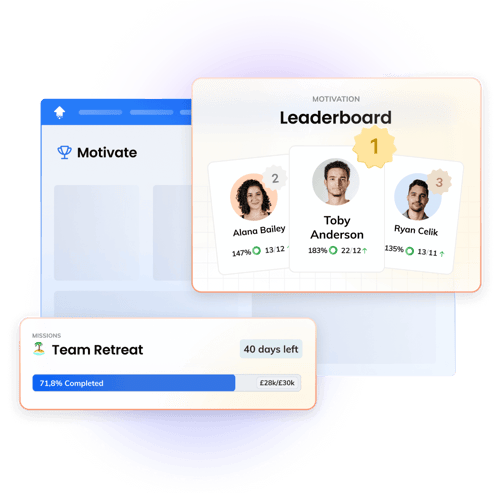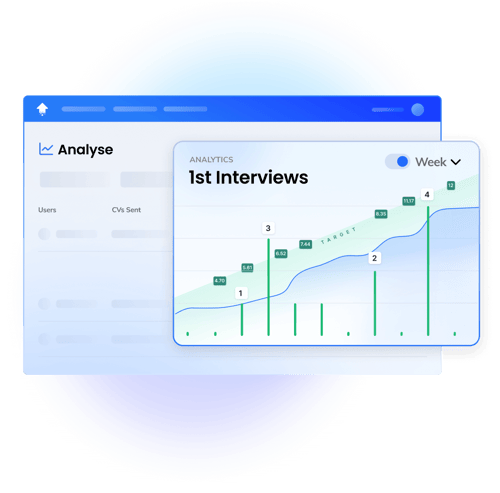Do recruiters make commission?
Absolutely.
Commission is a normal part of a recruiter’s compensation plan. In fact, they are paid in a very similar way to sales reps.
Typically, recruitment agencies pay commissions to their consultants when they fill open positions, or their hires pass their probationary period.
Read on to find out more about recruiter commissions, from typical commission structures to how they influence recruiter behaviour.
The Basics of Recruitment Commissions
So how do recruitment commissions work? How much commission does a recruiter get? And how do recruiters get paid commission?
How Do Recruiters Get Commission? Understanding Recruitment Commission Structures
Within recruitment agencies, commission is part of a standard compensation plan for recruiters.
Typically, the more placements external recruiters make, the more commission they receive — and therefore the more they earn overall.
These commission plans usually work in the same way as tax bands.
Here’s an example of a commission structure based on revenue:
£0-£5,000 — 5% commission
£5,000-£10,000 — 10% commission
£10,000-£20,000 — 15% commission
Within this structure, a consultant is entitled to a specific percentage of commission, depending on which threshold their revenue falls in.
Some customers will only pay a commission on the revenue after the next revenue threshold has been surpassed. So, in the example above, if a consultant brought £13,000 in revenue, they would be paid 5% on the first £5000, 10% on the second £5000, and 15% on the remaining £3000.
Other customers pay through ‘kickback’, in which a recruiter is paid the same percentage of all revenue. In this example, if a consultant brought £13,000 in revenue, they would receive a 15% commission on the total amount.
Commission plans usually operate on a monthly basis — but it is only paid out once the customer has paid the staffing agency.
It’s worth noting there are some differences between smaller and larger agencies.
Small Recruitment Agencies (<50 people)
Typically, all recruiters at small agencies will be on the same commission plan.
This will only vary if the company recruits for both permanent staff and contractors – who may work on two different commission structures.
Large Recruitment Agencies (>50 people)
Larger organisations often create bespoke commission plans with different thresholds for each recruiter.
A consultant’s commission structure could be based on their:
- Salary
- Targets
- Any add-ons they use such as LinkedIn licence
How Commissions Influence Recruiter Behaviour
Commission structures are a great motivator.
But how does the recruiter commission work for agencies?
To influence recruiter behaviour towards your desired goals, it's important to tie the commission structure into specific metrics. These could be the recruiter’s individual targets or your agency’s business goals — or a combination of the two.
For example, if your agency has just taken on a client that needs a large number of roles urgently filling, you may link commission to the number of roles filled within three months. If your client is looking for employees for leadership positions with hefty salaries, you may attach a commission to the new hire staying with the business for at least one year.
For larger agencies who offer different commission structures based on salary or seniority, recruiters may also be motivated to perform well in order to climb the ladder and therefore unlock access to higher commissions.
The Impact of Commission on Recruitment Outcomes
So, we’ve established that commission can be extremely effective in boosting recruitment outcomes for businesses with specific hiring needs.
So how exactly does commission impact recruitment?
Commission Plans and Recruitment Quality
When implemented correctly, commission plans can significantly boost the quality of recruitment.
It's all about the metrics you link to the commission plan.
Agency recruiters who work on commission plans will, by nature, be money-driven individuals who love the idea of winning big.
This means a motivating commission structure can go a long way to boosting recruitment quality and improving the whole hiring process — as long as you build out your plan with quality in mind.
Of course, it's a good idea to tie in the number of vacancies filled within a time period to the commission structure — but it's also crucial to focus on quality-driven metrics.
These metrics could be the length of employment, quality of candidate, time to productivity, or how well interviewees match the job description criteria. It's all about ensuring recruiters don't get carried away with the volume of candidates. Instead, put a laser-sharp focus on quality.
Aligning Commission Structures with Company Goals
When considering which metrics to employ, start with your organisational objectives and client roster.
What do you want your agency to achieve in the next year?
What common needs and pain points do your clients bring to the table?
Is there an area, or a specific industry, in which your agency struggles to fulfil client demands?
Answering these three questions requires both quantitative and qualitative data analysis and business strategy consultations with the leadership team.
Once you've gathered the required information, you can embark on a benchmarking exercise and set realistic targets.
Now, consider how your recruitment consultants fit into this roadmap.
What actions do your recruiters need to take to help you get where you're going?
This is where you determine the KPIs and metrics that will illustrate whether you're on track to hit your goals and show your progress in real-time.
You can now design the commission structure around those KPIs and metrics, then clearly communicate it to your recruiters, highlighting the connection between their individual and team performance and the agency’s overall objectives.
Commission and Recruitment Team Dynamics
On the subject of motivating your team…
Make the most of the motivational powers of commission by supercharging your strategy with cutting-edge recruitment analytics tech.
Leading recruiting analytics software OneUp boasts in-built motivational tools to encourage team collaboration and healthy competition.

With OneUp, you can display real-time leaderboards around your office so recruiters can see at a glance how they are performing compared to their colleagues.
Team leaders can create specific competitions amongst groups or individuals within the agency, based around company goals or personal development challenges. This should drive teamwork and inspire competition.
Don't forget to celebrate success when things are going well, too. OneUp has a bunch of fun celebratory features, such as the ability to set individual celebration anthems for your team.
Implementing and Adjusting Commission Plans
An effective roll-out of your commission plan is key to encouraging peak agency recruiter performance.
When implementing your plan, consider the following:
- Clarity is essential. Your structure must be easy for both you and your recruiters to understand, with every loophole closed. Ensure any targets and/or metrics attached to the commission structure are SMART, and the compensation for hitting them is crystal clear.
- Flexibility should be built into your commission structure. Why? Agency goals and objectives could change, your client roster could change, and there could be significant shifts within the market. Leave yourself some wiggle room.
- Outline when you will pay commissions. Make it clear commissions won’t be paid until the customer has paid their invoice. And then lay out when after this date the recruiter receives their commission.
Congratulations, you’ve rolled out your shiny new commission structure.
But the work doesn’t stop there.
Like any data-driven project, you need to monitor your results and adapt your commission plan to improve performance further.
Measuring the Success of Commission Plans
To measure the success of your commission plan, you first need to conduct a benchmarking exercise.
Consider your targets and goals, and determine which metrics are needed to track those.
For example, say your customers currently have a lot of vacancies to fill. You may be under pressure to fill those roles with candidates who are able to achieve peak productivity quickly.
In this case, you may want to focus on tracking 'time to fill' and 'time to productivity'. You may also want to look at the number of positions filled and the amount of time a new hire stays with the business — it all depends on your organisation's specific needs.
First, discover what your current results are for your chosen metrics, and then set realistic but productive targets and track how the implementation of the commission plan impacts these numbers.
While in the past, tracking recruitment analytics was an incredibly time-consuming and tedious job — you no longer have to go it alone.
With OneUp, you can monitor your specific metrics on real-time, custom dashboards, complete with handy visualisations to help you digest performance at a glance.

Final Thoughts on Recruitment Commission Plans
Recruitment commission plans are an extremely useful tool to motivate consultants, keep your customers happy, and grow as an agency.
But in order to boost performance, the commission needs to be tied to key metrics.
And this means you need to be able to accurately and efficiently track progress towards targets in real-time. So do your recruiters.
That's why it's vital to bring the right tech on board before planning your commission structures.
OneUp delivers real-time data on custom dashboards, ensuring transparency for your team.
For instance, you can set up one dashboard to track the performance of the whole team and another dashboard for every individual.
Not only does this preempt any commission-related discrepancies between your team — such as why is one person earning more commission than another — but it ensures all your data is in one place, making it easier for recruitment management to allocate the right commission.

